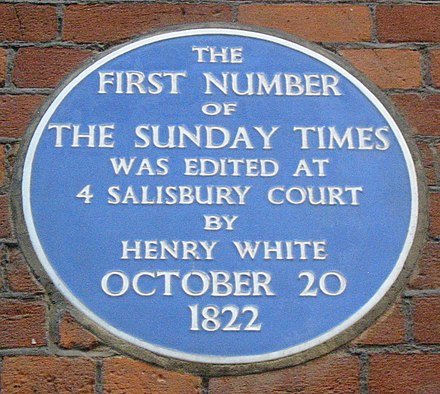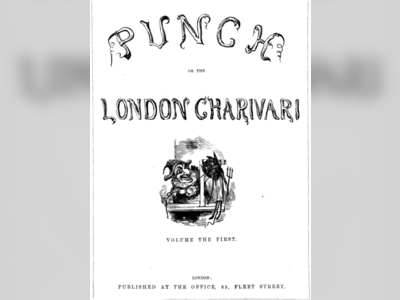British Heritage
Remember, Cherish, Learn.
beta
The Sunday Times
Contribution of The Sunday Times to British Heritage.
The Sunday Times holds a prominent place in British heritage, not only due to its long and illustrious history but also for its significant contributions to journalism, literature, and public discourse. As the largest newspaper in Britain's quality press market, it has played a pivotal role in shaping public opinion, promoting investigative journalism, and providing a platform for critical analysis of national and international events. Established in 1821 as The New Observer and later rebranded as The Sunday Times in 1822, it has consistently upheld its reputation for innovation and excellence in reporting.
The Sunday Times was founded in 1821 by Henry White as The New Observer but underwent a name change to the Independent Observer and finally became The Sunday Times in 1822. Under its early owner, Daniel Whittle Harvey, the newspaper set new standards in journalism by publishing the largest wood engraving in a British newspaper, depicting the coronation of Queen Victoria in 1838. Furthermore, it showcased its commitment to literature by serializing one of the first novels in a newspaper, William Harrison Ainsworth's Old St Paul's, in 1841.
In 1915, The Sunday Times underwent a change in ownership and fell under the leadership of Lord Camrose and Viscount Kemsley. During their ownership, the newspaper continued to pioneer in the industry, becoming the first Sunday newspaper to publish a 40-page issue in 1930 and shifting the front page focus from advertisements to news in 1940. It further solidified its reputation for investigative journalism and campaigning under the editorship of Harold Evans, who exposed the Thalidomide scandal in 1968, leading to a compensation settlement for affected individuals in the UK.
The Kemsley Newspapers Group, including The Sunday Times, was bought by Lord Thomson in 1959. Under his ownership, the newspaper reached a significant milestone in 1960, achieving a circulation of one million for the first time. In an era of technological advancements, the paper launched The Sunday Times Magazine in 1962, offering a separate section for lifestyle and culture-related content. The magazine gained popularity over time and inspired similar ventures by other newspapers.
In 1981, The Sunday Times came under the ownership of Rupert Murdoch's News International. The acquisition marked a new chapter in the newspaper's history, during which it faced both praise and controversy. Under editor Andrew Neil, The Sunday Times adopted a strongly Thatcherite stance, challenging traditional paternalistic conservatism. The paper's investigative reporting exposed several high-profile scandals, including "Cash for Questions" in 1994 and "Cash for Honours" in 2006.
Throughout the years, The Sunday Times continued to evolve and adapt to changing media landscapes. It launched its website in the late 1990s, reflecting the growing importance of digital media. The introduction of iPad and Android editions in subsequent years further expanded its reach and audience engagement. Despite facing a decline in print circulation, the newspaper remained resilient, continuing to publish high-quality journalism.
The Sunday Times has left an indelible mark on British heritage and media history. Its pioneering spirit and commitment to investigative reporting have set a standard for journalistic integrity and excellence. The paper's role in exposing scandals, promoting public awareness, and providing a platform for diverse voices have enriched public discourse and contributed to the nation's understanding of critical issues.
In conclusion, The Sunday Times, with its long and storied history, has emerged as a significant pillar of British heritage. Its enduring commitment to journalistic integrity, innovative reporting, and informed analysis has solidified its place as a leading newspaper in the quality press market. As the media landscape continues to evolve, The Sunday Times will undoubtedly continue to shape public discourse and contribute to British heritage for generations to come.
Founding and Early History
The Sunday Times was founded in 1821 by Henry White as The New Observer but underwent a name change to the Independent Observer and finally became The Sunday Times in 1822. Under its early owner, Daniel Whittle Harvey, the newspaper set new standards in journalism by publishing the largest wood engraving in a British newspaper, depicting the coronation of Queen Victoria in 1838. Furthermore, it showcased its commitment to literature by serializing one of the first novels in a newspaper, William Harrison Ainsworth's Old St Paul's, in 1841.
The Kemsley Years
In 1915, The Sunday Times underwent a change in ownership and fell under the leadership of Lord Camrose and Viscount Kemsley. During their ownership, the newspaper continued to pioneer in the industry, becoming the first Sunday newspaper to publish a 40-page issue in 1930 and shifting the front page focus from advertisements to news in 1940. It further solidified its reputation for investigative journalism and campaigning under the editorship of Harold Evans, who exposed the Thalidomide scandal in 1968, leading to a compensation settlement for affected individuals in the UK.
The Thomson Years
The Kemsley Newspapers Group, including The Sunday Times, was bought by Lord Thomson in 1959. Under his ownership, the newspaper reached a significant milestone in 1960, achieving a circulation of one million for the first time. In an era of technological advancements, the paper launched The Sunday Times Magazine in 1962, offering a separate section for lifestyle and culture-related content. The magazine gained popularity over time and inspired similar ventures by other newspapers.
The Murdoch Years
In 1981, The Sunday Times came under the ownership of Rupert Murdoch's News International. The acquisition marked a new chapter in the newspaper's history, during which it faced both praise and controversy. Under editor Andrew Neil, The Sunday Times adopted a strongly Thatcherite stance, challenging traditional paternalistic conservatism. The paper's investigative reporting exposed several high-profile scandals, including "Cash for Questions" in 1994 and "Cash for Honours" in 2006.
Modern Era and Digital Advancements
Throughout the years, The Sunday Times continued to evolve and adapt to changing media landscapes. It launched its website in the late 1990s, reflecting the growing importance of digital media. The introduction of iPad and Android editions in subsequent years further expanded its reach and audience engagement. Despite facing a decline in print circulation, the newspaper remained resilient, continuing to publish high-quality journalism.
Legacy and Impact
The Sunday Times has left an indelible mark on British heritage and media history. Its pioneering spirit and commitment to investigative reporting have set a standard for journalistic integrity and excellence. The paper's role in exposing scandals, promoting public awareness, and providing a platform for diverse voices have enriched public discourse and contributed to the nation's understanding of critical issues.
In conclusion, The Sunday Times, with its long and storied history, has emerged as a significant pillar of British heritage. Its enduring commitment to journalistic integrity, innovative reporting, and informed analysis has solidified its place as a leading newspaper in the quality press market. As the media landscape continues to evolve, The Sunday Times will undoubtedly continue to shape public discourse and contribute to British heritage for generations to come.
- The Sunday Timesen.wikipedia.org







